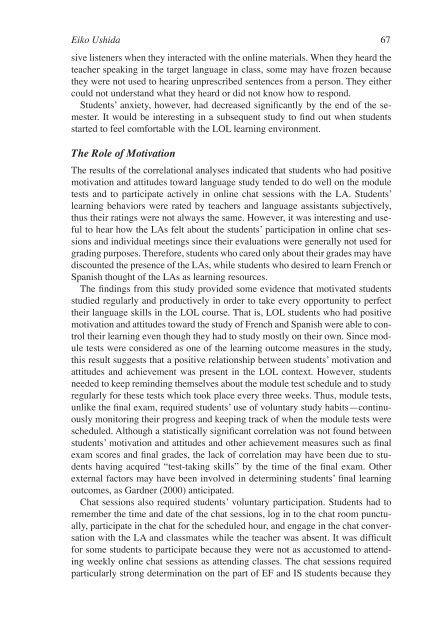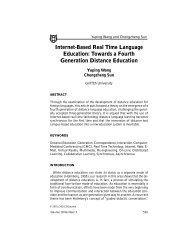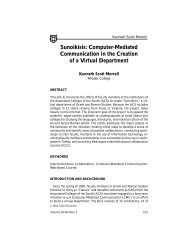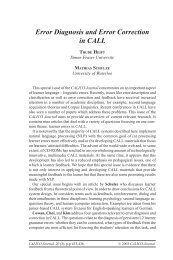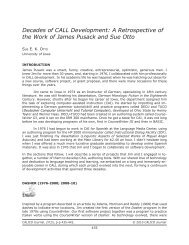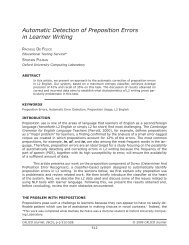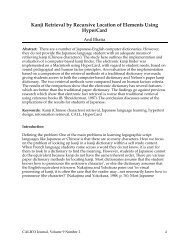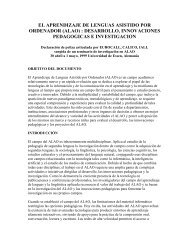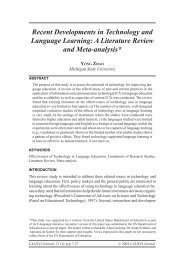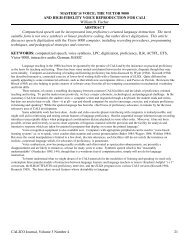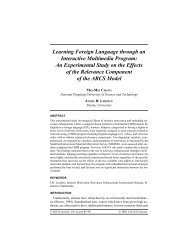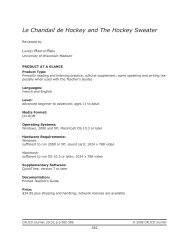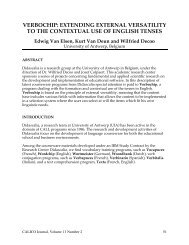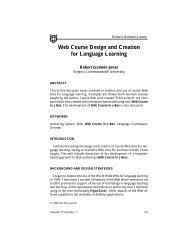The Role of Students' Attitudes and Motivation in Second ... - CALICO
The Role of Students' Attitudes and Motivation in Second ... - CALICO
The Role of Students' Attitudes and Motivation in Second ... - CALICO
Create successful ePaper yourself
Turn your PDF publications into a flip-book with our unique Google optimized e-Paper software.
Eiko Ushida 67<br />
sive listeners when they <strong>in</strong>teracted with the onl<strong>in</strong>e materials. When they heard the<br />
teacher speak<strong>in</strong>g <strong>in</strong> the target language <strong>in</strong> class, some may have frozen because<br />
they were not used to hear<strong>in</strong>g unprescribed sentences from a person. <strong>The</strong>y either<br />
could not underst<strong>and</strong> what they heard or did not know how to respond.<br />
Students’ anxiety, however, had decreased significantly by the end <strong>of</strong> the semester.<br />
It would be <strong>in</strong>terest<strong>in</strong>g <strong>in</strong> a subsequent study to f<strong>in</strong>d out when students<br />
started to feel comfortable with the LOL learn<strong>in</strong>g environment.<br />
<strong>The</strong> <strong>Role</strong> <strong>of</strong> <strong>Motivation</strong><br />
<strong>The</strong> results <strong>of</strong> the correlational analyses <strong>in</strong>dicated that students who had positive<br />
motivation <strong>and</strong> attitudes toward language study tended to do well on the module<br />
tests <strong>and</strong> to participate actively <strong>in</strong> onl<strong>in</strong>e chat sessions with the LA. Students’<br />
learn<strong>in</strong>g behaviors were rated by teachers <strong>and</strong> language assistants subjectively,<br />
thus their rat<strong>in</strong>gs were not always the same. However, it was <strong>in</strong>terest<strong>in</strong>g <strong>and</strong> useful<br />
to hear how the LAs felt about the students’ participation <strong>in</strong> onl<strong>in</strong>e chat sessions<br />
<strong>and</strong> <strong>in</strong>dividual meet<strong>in</strong>gs s<strong>in</strong>ce their evaluations were generally not used for<br />
grad<strong>in</strong>g purposes. <strong>The</strong>refore, students who cared only about their grades may have<br />
discounted the presence <strong>of</strong> the LAs, while students who desired to learn French or<br />
Spanish thought <strong>of</strong> the LAs as learn<strong>in</strong>g resources.<br />
<strong>The</strong> f<strong>in</strong>d<strong>in</strong>gs from this study provided some evidence that motivated students<br />
studied regularly <strong>and</strong> productively <strong>in</strong> order to take every opportunity to perfect<br />
their language skills <strong>in</strong> the LOL course. That is, LOL students who had positive<br />
motivation <strong>and</strong> attitudes toward the study <strong>of</strong> French <strong>and</strong> Spanish were able to control<br />
their learn<strong>in</strong>g even though they had to study mostly on their own. S<strong>in</strong>ce module<br />
tests were considered as one <strong>of</strong> the learn<strong>in</strong>g outcome measures <strong>in</strong> the study,<br />
this result suggests that a positive relationship between students’ motivation <strong>and</strong><br />
attitudes <strong>and</strong> achievement was present <strong>in</strong> the LOL context. However, students<br />
needed to keep rem<strong>in</strong>d<strong>in</strong>g themselves about the module test schedule <strong>and</strong> to study<br />
regularly for these tests which took place every three weeks. Thus, module tests,<br />
unlike the f<strong>in</strong>al exam, required students’ use <strong>of</strong> voluntary study habits—cont<strong>in</strong>uously<br />
monitor<strong>in</strong>g their progress <strong>and</strong> keep<strong>in</strong>g track <strong>of</strong> when the module tests were<br />
scheduled. Although a statistically significant correlation was not found between<br />
students’ motivation <strong>and</strong> attitudes <strong>and</strong> other achievement measures such as f<strong>in</strong>al<br />
exam scores <strong>and</strong> f<strong>in</strong>al grades, the lack <strong>of</strong> correlation may have been due to students<br />
hav<strong>in</strong>g acquired “test-tak<strong>in</strong>g skills” by the time <strong>of</strong> the f<strong>in</strong>al exam. Other<br />
external factors may have been <strong>in</strong>volved <strong>in</strong> determ<strong>in</strong><strong>in</strong>g students’ f<strong>in</strong>al learn<strong>in</strong>g<br />
outcomes, as Gardner (2000) anticipated.<br />
Chat sessions also required students’ voluntary participation. Students had to<br />
remember the time <strong>and</strong> date <strong>of</strong> the chat sessions, log <strong>in</strong> to the chat room punctually,<br />
participate <strong>in</strong> the chat for the scheduled hour, <strong>and</strong> engage <strong>in</strong> the chat conversation<br />
with the LA <strong>and</strong> classmates while the teacher was absent. It was difficult<br />
for some students to participate because they were not as accustomed to attend<strong>in</strong>g<br />
weekly onl<strong>in</strong>e chat sessions as attend<strong>in</strong>g classes. <strong>The</strong> chat sessions required<br />
particularly strong determ<strong>in</strong>ation on the part <strong>of</strong> EF <strong>and</strong> IS students because they


